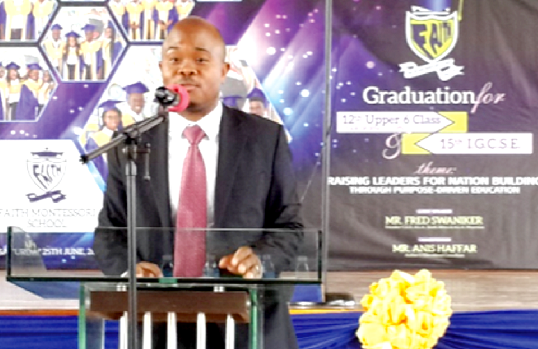
African Leadership University re-imagines tertiary education
The problems associated with youth unemployment across Africa are so alarming, that for our graduates to be processed out of tertiary institutions, year after year, without the skills to solve problems or opportunities to be entrepreneurs is a great disservice to the continent.
Advertisement
In the column, “Ban the lectures and focus on the world of work,” (April 25, 2016), I noted that “The traditional academic type education being foisted on the nation’s youth need to be thought through to see if that is what Ghana needs at this point in her history.
Frankly, it has long outlived its usefulness and has really become part of the problem considering the nation’s continuous underdevelopment.
If, as they say, technical universities should be problem solving-oriented, then what must the traditional universities be? All educational institutions must be problem solving, to see both the people and the nation prosper.”
The Economist weekly (June 25, 2016) noted, for instance, that there’s “a trend that is reshaping how some students learn (necessitating) the ‘rise of the challenge-driven university’.
In the past 15 years dozens such institutions have been set up, from Chile to China. Many more are planned. Though they differ in scope, they share an approach.
They reject the usual ways of getting young adults to learn: lectures, textbooks, slogs in the library, exams – and professors. Instead students work on projects in teams, trying to solve problems.”
Invited as a guest speaker at the African Leadership University (ALU), in Mauritius, in July 2016, I visited some classes led by facilitators and not by lecturers or professors. After a particular session, I said to the facilitator, “That was a wonderful class, I enjoyed being in it but I want to know how you prepare so well for a course such as this where everyone is comfortable and everyone is contributing.” I added that she was a born teacher.
Experiential Learning at ALU
The facilitator, Tolulope Agunbiade, said, “For our course, which is ‘Entrepreneurial Leadership’, we come together and we decide on what the full year curriculum should look like so we have the high level overview and at the end we ask, What are we trying to achieve? For us, it’s how we can get people to think like entrepreneurs, be able to identify problems and solve them in a very systemic way. And then we break our larger curriculum into smaller modules so we can focus for almost five weeks and ask, Just how do you spot an opportunity?”
She continued, “And within these five weeks, we break (the modules) down into separate lessons and for each lesson we think of what our learning outcomes are. What are the best ways to hit our learning outcomes in the most engaging way? So we usually start with some sort of experiential discovery to ease you into it using either a game or real life experiences, and from there we transition and ask, How do we bring it home to what we are then doing?
That’s when we start soliciting examples from people within the class. Tell us about a time when this happened to you, and from there we take them into a larger thing; how can you then see in your community or in your country a current problem that is happening? How could we have thought about it, for example, more systemically?”
That was the vigour of that particular class. Tolu is Nigerian, and has a degree in Accounting from the University of Abuja. She said, “We usually have the same plans where we just think: What is the topic we are trying to hit on? How long will it be for? What are the objectives we are trying to hit and how do we plan out the sessions? So we start with the activity, the instructions, the experiential, the debrief - which is very important because that is where we get all the knowledge that the students have learnt so far and hear them say it in their own words - and then the question: What is the question that we are trying to introduce them to?”
Fred Swaniker is the Founder and Chairman of the African Leadership Group – an ecosystem of organisations that includes the African Leadership Academy (ALA) in South Africa, the African Leadership Network, the Africa Advisory Group, and of course, the African Leadership University. Fred is deeply passionate about Africa and has worked in and visited about 25 countries on the continent. He has been recognised as a Young Global Leader by the World Economic Forum and was recognised by Forbes magazine as one of the top 10 young ‘power men’ in Africa. He has an MBA from Stanford Business School.
The ALU Foundation Core
Necessity is the mother of innovation. Intended to help students develop skills and enhance their learning experience inside the classroom and during their annual internships, the four innovative Foundation Courses serve as follows:
1. Data & Decisions: Understanding data and its implications in the real world.
2. Communication for Impact: Developing the necessary skills to communicate effectively in a professional setting.
3. Projects: Engaging in real life case studies similar to working in an actual organisation.
4. Entrepreneurial Leadership: Discovering the soft skills needed to make a great leader.
Fred wrote the plan for the African Leadership Academy at Stanford. Dubbed “The University of the Future”, ALU offers a pioneering fresh approach to university education in the 21st century “by integrating students’ learning with the real world, empowering students to take ownership of their own learning, equipping each student to think entrepreneurially, and employing the most engaging and inspiring teaching methods.”
ALU is quite Pan-African, with students from Morocco to South Africa, and from Senegal to Ethiopia.
[Email: [email protected]]



